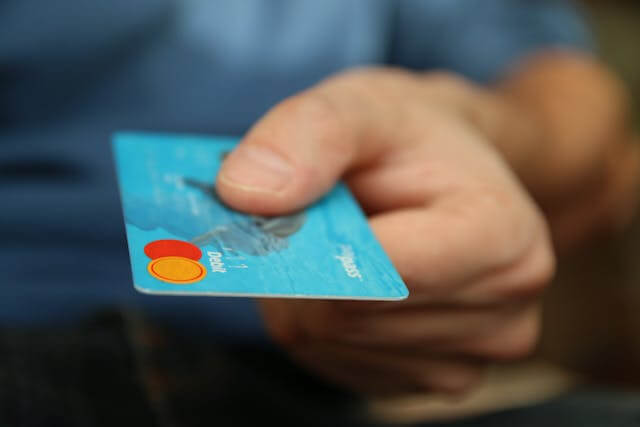Table of Contents
German banking vocabulary helps learners who want to expand their knowledge of words related to money, finance and banking. Whether you’re opening a bank account, discussing finances, or simply want to understand banking terms, this article will equip you with the essential words and phrases you need.
Essential German Banking Terms
Below is a comprehensive list of German vocabulary related to money and banking. The list is sorted alphabetically based on the German words (ignoring articles). Use this list to familiarize yourself with common financial terms.
- abheben (to withdraw)
- die Aktie (the stock, share)
- die Bank (the bank)
- die Bankkarte (the bank card)
- das Bargeld (the cash)
- die Einzahlung (the deposit)
- das Formular (the form)
- der Geldautomat (the ATM)
- das Geld (the money)
- das Girokonto (the checking account)
- gründen (to establish, to found)
- die Karte (the card)
- das Konto (the account)
- der Kontostand (the account balance)
- kostenlos (free of charge)
- leihen (to lend, to borrow)
- das Online-Banking (the online banking)
- das Passwort (the password)
- die Rechnung (the invoice, bill)
- (Geld) sparen (to save money)
- das Sparkonto (the savings account)
- überweisen (to transfer)
- die Überweisung (the transfer)
- verdienen (to earn)
- die Währung (the currency)
- wechseln (to exchange/change)
- zahlen (to pay)
- die Zahlung (the payment)
- die Zinsen (the interest – financial)
Sentences with Banking Vocabulary

Here are example sentences to help you understand how to use these vocabulary words in context.
| German Word | German Example Sentence | English Translation |
|---|---|---|
| abheben | Ich möchte 100 Euro von meinem Konto abheben. | I would like to withdraw 100 euros from my account. |
| die Aktie | Er hat Aktien von einem großen Unternehmen gekauft. | He bought shares of a large company. |
| die Bank | Die Bank schließt um 16 Uhr. | The bank closes at 4 PM. |
| die Bankkarte | Ich habe meine Bankkarte verloren. | I lost my bank card. |
| das Bargeld | Bezahlen Sie mit Karte oder Bargeld? | Are you paying by card or cash? |
| die Einzahlung | Die Einzahlung wurde Ihrem Konto gutgeschrieben. | The deposit has been credited to your account. |
| das Formular | Bitte füllen Sie dieses Formular aus. | Please fill out this form. |
| der Geldautomat | Wo ist der nächste Geldautomat? | Where is the nearest ATM? |
| das Geld | Ich habe kein Geld dabei. | I don’t have any money with me. |
| das Girokonto | Ich möchte ein Girokonto eröffnen. | I would like to open a checking account. |
| gründen | Sie möchten eine Firma gründen. | They want to establish a company. |
| die Karte | Kann ich mit Karte zahlen? | Can I pay by card? |
| das Konto | Wie ist Ihre Kontonummer? | What is your account number? |
| der Kontostand | Ich möchte meinen Kontostand prüfen. | I would like to check my account balance. |
| kostenlos | Die Kontoeröffnung ist kostenlos. | Opening the account is free of charge. |
| leihen | Kannst du mir 20 Euro leihen? | Can you lend me 20 euros? |
| das Online-Banking | Ich nutze gerne Online-Banking. | I like to use online banking. |
| das Passwort | Bitte geben Sie Ihr Passwort ein. | Please enter your password. |
| die Rechnung | Die Rechnung ist fällig. | The invoice is due. |
| sparen | Ich spare Geld für meinen Urlaub. | I’m saving money for my vacation. |
| das Sparkonto | Er hat ein Sparkonto eröffnet. | He opened a savings account. |
| überweisen | Ich werde das Geld morgen überweisen. | I will transfer the money tomorrow. |
| die Überweisung | Die Überweisung ist noch nicht angekommen. | The transfer hasn’t arrived yet. |
| verdienen | Wie viel verdienst du im Monat? | How much do you earn per month? |
| die Währung | Der Euro ist die Währung in Deutschland. | The euro is the currency in Germany. |
| wechseln | Wo kann ich Geld wechseln? | Where can I exchange money? |
| zahlen | Ich möchte die Rechnung jetzt zahlen. | I would like to pay the bill now. |
| die Zahlung | Die Zahlung ist eingegangen. | The payment has been received. |
| die Zinsen | Die Zinsen für dieses Darlehen sind hoch. | The interest on this loan is high. |
Free Banking Vocabulary Quiz
Ready to test your understanding? Take our German banking vocabulary quiz to see how much you’ve learned.
Short Stories About Banking
Immerse yourself in short stories that incorporate the banking vocabulary you’ve learned. Reading stories in German helps improve comprehension and retention.
Conclusion
Expanding your German banking vocabulary not only enhances your language skills but also prepares you for real-life financial situations in German-speaking countries. Regular practice and exposure to these terms will build your confidence in managing financial matters.
Keep practicing, and don’t hesitate to revisit this guide whenever you need a refresher. Viel Erfolg! (Good luck!)
FAQ
Why should I learn German banking vocabulary?
Learning banking vocabulary helps you handle everyday financial tasks such as opening a bank account, transferring money, and understanding banking documents. It is essential for daily life in Germany, Austria, or Switzerland.
What is the best way to learn banking terms?
Start with a clear word list and read example sentences to understand each word in context. Practice regularly with quizzes and short stories to reinforce new vocabulary and remember the words more easily.
Is this vocabulary useful if I plan to move to Germany?
Yes. These words are important if you want to open a bank account, apply for a job, rent an apartment, or manage money in a German-speaking country.
What level is this vocabulary for?
This list is best suited for learners at A2 to B1 level. It focuses on everyday financial terms and phrases that are used in real conversations and banking situations.
Where can I practice German banking vocabulary?
You can take our free banking vocabulary quiz and explore more vocabulary lists to continue practicing.
Are example sentences included?
Yes. Each word includes a full sentence in German with an English translation.
Are these words used in Austria and Switzerland too?
The terms in this list are widely understood in all German-speaking countries.
Do I need to memorize everything?
You don’t have to memorize all words at once. Focus on learning the most important words first. Then build your knowledge step by step by using quizzes, flashcards, or reading short stories that include banking vocabulary.
What are the most important German banking words?
Some of the most common words include:
das Konto (account)
die Bank (bank)
die Zahlung (payment)
die Überweisung (transfer)
der Geldautomat (ATM)
das Passwort (password)

